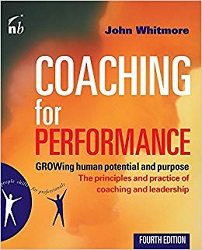What We're Reading Now
What Is a Coach?
9 July 2019
Eden read Coaching for Performance: Growing Human Potential and Purpose by John Whitmore and learned the difference between instructing and coaching.
Tags: coaching, eden read, management and supervision
Anyone who knows sports, knows that a coach can make or break a team. Thinking back to my own days playing sports in middle school and high school, I had between one and four coaches at any given time. Some of the phrases I remember hearing from them are: “Follow through on your swing,” “Keep your shoulders down,” and of course, “Keep your eye on the ball.” These coaching relationships shaped my beliefs about professional coaching; I thought it would be something like motivational advising. I imagined a professional coach would spend most of her time saying, “Have you considered this perspective?” or, “Here’s how I’d approach it.” And while these kinds of phrases are common, helpful, and appropriate in the workplace, I recently learned that a recommendation-based relationship like the kind I had with my coaches growing up is actually a form of instructing, not coaching.
Coaching for Performance: Growing Human Potential and Purpose by John Whitmore, is one of Allison Partners’ all-time favorite books and is the book that introduced me to the fundamentals of professional coaching, which I learned is very different from teaching or instructing. Pure coaching embraces the philosophy that the coachee has all of the potential he needs to tackle any challenge. And the role of the coach is to raise the coachee’s self-awareness by asking questions. For example, in sports Whitmore says it is more helpful to ask a tennis player what direction the ball is spinning than it is to say, “Keep your eye on the ball.” This is because the right questions both increase the coachee’s attention and engagement and, when used appropriately, increase buy-in to a solution because the coachee has generated his own solution instead of accepting one that was offered to him.

What most stuck out to me while reading Coaching for Performance is Whitmore’s assertion that a coach does not need to be an expert in the coachee’s field in order to ask helpful questions. This surprised me since I’ve always thought that the best coaches were the ones who had the most functional expertise. However, this premise is based on the assumption that coaches almost always know the right way of doing things, which just isn’t true. Whitmore says that in order to have an impact on a coachee, the only thing a coach needs to be an expert in is, well, coaching. And coaching is about helping others learn instead of teaching them.
Here are a few of Whitmore’s examples of questions that a professional coach might ask:
- “What would you like to have by the end of this coaching session?”
- “How much of this situation do you feel is within your control?”
- “What are all the different ways in which you could approach this issue?”
- “To what extent does this meet all your objectives?”
It’s easy to see how questions like this keep the coachee in the driver’s seat and bring attention to the coachee’s own capability and potential. However, I am often impatient with these kinds of questions myself because I tend to think that anyone asking a question already has an answer in mind. Instead of becoming self-reflective, I become suspicious that I’m being tested, and stare blankly wishing that someone would just tell me the punchline already. However, after reading Coaching for Performance and recognizing this about myself, I’ve been considering how I can shift my thinking processes to become more coachable as I move forward in my career.
I’m starting by asking myself the kinds of questions that a coach might ask. For example, I know that I would benefit from taking a moment to ask myself if there are any perspectives I haven’t considered more often than I currently do. I also am reminding myself what a coach would believe: I am creative and capable, and I hold the keys to my own learning. Reminding myself of this helps me to be less anxious when my thinking is challenged or when I am faced with a question. If you’re interested in learning more about the fundamentals of coaching, self-coaching, or becoming more coachable, I think that reading Coaching for Performance would be a great place to start.







Comments
Our Comment Policy:
Our blog posts are only half of the conversation. What our readers have to say is equally important to us, and we're grateful for all the comments that continue the dialog.
To ensure that the discussion here is as useful as possible to all of our readers, please be respectful of our contributors and refrain from harassing, threatening and/or vulgar language. We reserve the right to screen and remove any comments from the site. If you have a question about a comment or want to discuss our policy, please contact us. We'll talk it over.
There are no comments for this entry yet.